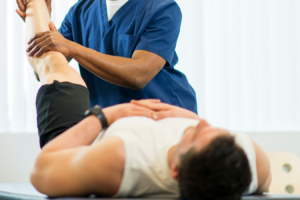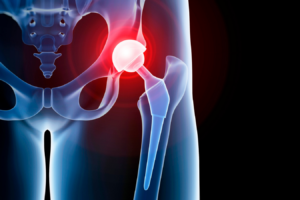 Hip pain isn’t just for the elderly. In fact, adults of all ages, especially athletes and people who are highly active, often experience hip pain. Regardless of your age or activity level, hip pain can be debilitating and wear on your quality of life. In this post, we’ll discuss some of the treatment options available for hip pain caused by the most common hip-related condition, osteoarthritis.
Hip pain isn’t just for the elderly. In fact, adults of all ages, especially athletes and people who are highly active, often experience hip pain. Regardless of your age or activity level, hip pain can be debilitating and wear on your quality of life. In this post, we’ll discuss some of the treatment options available for hip pain caused by the most common hip-related condition, osteoarthritis.
Why does my hip hurt?
Though several conditions, including trochanteric bursitis, could be the cause of a person’s hip pain, the most common by far is osteoarthritis, also called ‘degenerative joint disease’. As we age, the joint surface cartilage that normally serves as a ‘pad’ or bearing to the hip joint wears away. For some people, the cartilage wears down to the point of bone-on-bone grinding and thus, causes osteoarthritis.
What are the symptoms of osteoarthritis?
Osteoarthritis may present itself in the form of pain, stiffness, tenderness to the touch, loss of flexibility, a grinding sensation within the joint, and swelling. These symptoms may affect a person’s everyday life. Unfortunately, this wear and tear on the cartilage cannot be reversed. But thankfully, various treatment options are available that may help.
 Conservative (Non-Surgical) Hip Pain Treatment
Conservative (Non-Surgical) Hip Pain Treatment
During your initial appointment, the doctor will likely order x-rays, check your medical history, and perform a physical exam to test your hip’s flexibility, stiffness, and tenderness. If you show signs of osteoarthritis, the doctor will likely suggest conservative treatments first. This typically includes an anti-inflammatory medication regimen to help reduce pain and swelling. Additionally, your doctor may recommend physical therapy. Physical therapy for hip arthritis often includes stretches to help loosen the IT band that surrounds the hip. Essentially, this should give the hip more space to function and hopefully, help to reduce pain and swelling.
Surgical Hip Pain Treatment Options
 Total Hip Replacement Surgery
Total Hip Replacement Surgery
If conservative treatments like anti-inflammatory medication and physical therapy don’t help, other treatment options are available. As we’ve discussed in a previous post, it may be difficult to know when it’s time for a hip replacement. But generally, your physician may consider a total hip replacement if you are still experiencing extreme pain, stiffness, tenderness, and a grinding sensation. Typically, total hip replacements are also reserved for those above the age of 50. The reason is that hip replacements cannot withstand repeated high-intensity activities like running, jumping, or playing sports. Most patients have slowed down their active lifestyles somewhat by age 50. Thus, hip replacement surgery is usually more successful for them.
What happens during Hip Replacement Surgery?
During a total hip replacement, an orthopedic surgeon will first make a cut at the top of the femur (thigh bone) and remove the entire damaged ball from the joint. Then, they will place a metal stem inside the femoral shaft (the hollow part of the femur) with a ceramic ball attached to the end. Next, the surgeon will place a thin metal layer inside the socket portion of the joint as a lining. Finally, the surgeon will fit the ceramic ball into the acetabulum (socket portion at the bottom of the pelvis). These pieces of metal and ceramic will be the patient’s new hip and all hip pain should cease.
Does hip replacement come with any restrictions?
Following hip replacement surgery, patients are typically able to go back to most of their normal activities. However, patients should follow a few post-surgical restrictions to help ensure a successful recovery and continued pain relief. To minimize wear-and-tear on your new hip, your doctor will likely warn against running or jumping. Continued running, jumping, or high-intensity exercise could damage the equipment and result in additional surgery.
Birmingham Hip Resurfacing Surgery
If you have severe osteoarthritis symptoms but haven’t reached age 50 yet, don’t worry! There are still treatment options available. In fact, patients ages 30 to 40 who have tried conservative treatments but still have pain, swelling, tenderness, loss of flexibility, and a grinding sensation within the joint may be eligible for Birmingham Hip Resurfacing. Currently, this procedure is performed primarily on male patients because it requires a large surface area for both the bone and metal cap involved. Generally, the male anatomy is large enough to accommodate such implants.
What happens during Birmingham Hip Resurfacing Surgery?
This procedure allows the patient to keep most of their femoral head (top of the thigh bone). However, the surgeon will shave the femoral head down somewhat, like a dentist shaves a tooth down before placing a cap on top. Next, the surgeon drills a shallow hole down the center of the shaved femoral head and fits a metal cap to the top of the femur bone. Finally, they will cement the small peg coming out of the bottom of the cap into the drilled hole. This procedure allows patients to continue to have an active lifestyle.
When should I talk to a doctor?
Any form of chronic pain may worsen and lead to additional complications if left untreated. If you notice your symptoms are negatively impacting your life, consult an orthopaedic specialist as soon as possible to receive a proper diagnosis and treatment plan.
We can help.
At Advanced Ortho and Spine (AOS), we have extensive knowledge and expertise in treating patients with hip pain. Most are able to get back to living their best lives with only conservative treatment. Dr. Christopher Cook and Dr. Lee Swiderek at AOS specialize in treating a variety of orthopaedic conditions, including hip osteoarthritis. Request an appointment online or call us at 615.885.0200 to schedule yours today.
 Dr. Christopher Cook is a Board-Certified Orthopaedic Surgeon and Sports Medicine & Joint Replacement Specialist at Advanced Ortho and Spine. He provides a full spectrum of Joint Replacement, Sports Medicine, and Shoulder & Upper Extremity services. Contact us today for more information or to request an appointment. Contact us today for more information or to request an appointment.
Dr. Christopher Cook is a Board-Certified Orthopaedic Surgeon and Sports Medicine & Joint Replacement Specialist at Advanced Ortho and Spine. He provides a full spectrum of Joint Replacement, Sports Medicine, and Shoulder & Upper Extremity services. Contact us today for more information or to request an appointment. Contact us today for more information or to request an appointment.
 Dr. Lee Swiderek is a Fellowship-Trained Orthopedic Surgeon & Joint Replacement Specialist at Advanced Ortho and Spine. He provides a full spectrum of Joint Replacement and Complex Hip and Knee Reconstruction services. Contact us today for more information or to request an appointment.
Dr. Lee Swiderek is a Fellowship-Trained Orthopedic Surgeon & Joint Replacement Specialist at Advanced Ortho and Spine. He provides a full spectrum of Joint Replacement and Complex Hip and Knee Reconstruction services. Contact us today for more information or to request an appointment.

With two locations near Nashville in Mt. Juliet and Hermitage, Advanced Ortho and Spine provides patients with high-quality, personalized care while advancing orthopaedic excellence. Contact us today to learn more or to schedule your appointment.
Disclaimer: This blog provides general information and discussions about health and related subjects. The information and other content provided in this blog, or in any linked materials, are not intended and should not be construed as medical advice, nor is the information a substitute for professional medical expertise or treatment.If you or any other person has a medical concern, you should consult with your healthcare provider or seek other professional medical treatment. Never disregard professional medical advice or delay in seeking it because of something read on this blog or in any linked materials. If you think you may have a medical emergency, call your doctor or emergency services immediately.
The opinions and views expressed on this blog and website have no relation to those of any academic, hospital, health practice, or other institution.

